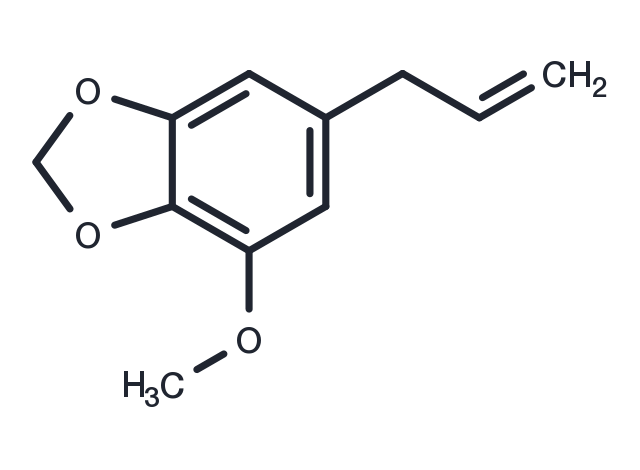store at low temperature
Powder: -20°C for 3 years | In solvent: -80°C for 1 year

Myristicin (Myristicine) is a natural product found in spices and umbelliferous plants. Myristicin has anti-cholinergic, Antibacterial, and hepatoprotective effects, it also has anti-inflammatory properties related with its inhibition of NO, cytokines,chemokines, and growth factors in dsRNA-stimulated macrophages via the calcium pathway. Myristicin can induce Apoptosis as characterised by alterations in the mitochondrial membrane potential, cytochrome c release, Caspase-3 activation, PARP-cleavage and DNA fragmentation.

| Pack Size | Availability | Price/USD | Quantity |
|---|---|---|---|
| 5 mg | In stock | $ 39.00 | |
| 10 mg | In stock | $ 64.00 | |
| 25 mg | In stock | $ 128.00 | |
| 50 mg | In stock | $ 213.00 | |
| 100 mg | In stock | $ 318.00 | |
| 1 mL * 10 mM (in DMSO) | In stock | $ 43.00 |



| Description | Myristicin (Myristicine) is a natural product found in spices and umbelliferous plants. Myristicin has anti-cholinergic, Antibacterial, and hepatoprotective effects, it also has anti-inflammatory properties related with its inhibition of NO, cytokines,chemokines, and growth factors in dsRNA-stimulated macrophages via the calcium pathway. Myristicin can induce Apoptosis as characterised by alterations in the mitochondrial membrane potential, cytochrome c release, Caspase-3 activation, PARP-cleavage and DNA fragmentation. |
| Source |
| Synonyms | Myristicine |
| Molecular Weight | 192.21 |
| Formula | C11H12O3 |
| CAS No. | 607-91-0 |
store at low temperature
Powder: -20°C for 3 years | In solvent: -80°C for 1 year
DMSO: 1.92 mg/mL (10.01 mM)
You can also refer to dose conversion for different animals. More
bottom
Please see Inhibitor Handling Instructions for more frequently ask questions. Topics include: how to prepare stock solutions, how to store products, and cautions on cell-based assays & animal experiments, etc.
Myristicin 607-91-0 Apoptosis Chromatin/Epigenetic DNA Damage/DNA Repair GPCR/G Protein Immunology/Inflammation Membrane transporter/Ion channel Metabolism Microbiology/Virology Neuroscience Proteases/Proteasome NO Synthase Caspase GABA Receptor P450 BCL Anti-infection IL Receptor 5-HT Receptor PARP Serotonin Receptor Inhibitor Myristicine 5-hydroxytryptamine Receptor inhibit inhibitor
